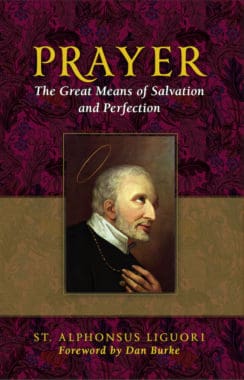The Ends of Mental Prayer
In order to practice well mental prayer, or meditation, and to make it truly profitable to the soul, we must well ascertain the ends for which we attempt it.
To Unite Ourselves to God
We must meditate in order to unite ourselves more completely to God. It is not so much good thoughts in the intellect as good acts of the will, or holy desires, that unite us to God; and such are the acts which we perform in meditation—acts of humility, confidence, self-sacrifice, resignation, and especially of love and of repentance for our sins. Acts of love, says St. Teresa, are those that keep the soul inflamed with holy love.
But the perfection of this love consists in making our will one with that of God; for the chief effect of love, as Dionysius the Areopagite says, is to unite the wills of those who love, so that they have but one heart and one will. St. Teresa also says, “All that he who exercises himself in prayer should aim at is to conform himself to the divine will, and he may be assured that in this consists the highest perfection; he who best practices this will receive the greatest gifts from God and will make the greatest progress in an interior life.”
There are many, however, who complain that they go to prayer and do not find God, the reason of which is that they carry with them a heart full of earth. “Detach the heart from creatures,” says St. Teresa; “seek God, and you will find Him.” “The Lord is good to them that hope in Him, to the soul that seeketh Him” (Lam. 3:25). Therefore, to find God in prayer, the soul must be stripped of its love for the things of earth, and then God will speak to it: “I will lead her into the wilderness, and I will speak to her heart” (Hos. 2:14). But in order to find God, solitude of the body, as St. Gregory observes, is not enough; that of the heart is necessary too. The Lord one day said to St. Teresa: “I would willingly speak to many souls; but the world makes such a noise in their heart that my voice cannot make itself heard.” Ah! When a detached soul is engaged in prayer, truly does God speak to it and make it understand the love which He has borne it; and then the soul, says St. Laurence Justinian, burning with holy love, speaks not; but in that silence, oh, how much does it say! The silence of charity, observes the same writer, says more to God than could be said by the utmost powers of human eloquence; each sigh that it utters is a manifestation of its whole interior. It then seems as if it could not repeat often enough, “My Beloved to me, and I to Him.”
To Obtain Grace from God
We must meditate in order to obtain from God the graces that are necessary to advance in the way of salvation, and especially to avoid sin, and to use the means which will lead us to perfection.
The best fruit that comes from meditation is the exercise of prayer. Almighty God, ordinarily speaking, does not give grace to any but those who pray. St. Gregory writes: “God desires to be entreated; He desires to be constrained; He desires to be, as it were, conquered by importunity.” It is true that at all times the Lord is ready to hear us, but at the time of meditation, when we are most truly in converse with God, He is most bountiful in giving us His aid.
Above all, should we, in meditation, ask God for perseverance and His holy love. Final perseverance is not a single grace, but a chain of graces, to which must correspond the chain of our prayers. If we cease to pray, God will cease to give us His help, and we shall perish. He who does not practice meditation will find the greatest difficulty in persevering in grace till death. Let us remember what Palafox says: “How will the Lord give us perseverance if we do not ask it? And how shall we ask for it without meditation? Without meditation there is no communion with God.”
We must also be urgent with prayers to obtain from God His holy love. St. Francis de Sales says that all virtues come in union with holy love. “All good things came to me together with her” (Wisd. 7:7).
Let us, therefore, pray continually for perseverance and love; and, in order to pray with greater confidence, let us ever bear in mind the promise made us by Jesus Christ, that whatever we seek from God through the merits of His Son, He will give it to us. Let us, then, pray, and pray always, if we would that God should make us abound in every blessing. Let us pray for ourselves, and, if we have zeal for the glory of God, let us pray also for others. It is a thing most pleasing to God to be entreated for unbelievers and heretics, and all sinners. “Let the people, O God, confess to Thee” (Ps. 66:6). Let us say, O Lord, make them know Thee, make them love Thee. We read in the lives of St. Teresa and St. Mary Magdalene of Pazzi how God inspired these holy women to pray for sinners. And to prayer for sinners let us also add prayers for the holy souls in Purgatory.
We Ought Not to Seek in Mental Prayer Spiritual Consolations
We must apply ourselves to meditation not for the sake of spiritual consolations but chiefly in order to learn what is the will of God concerning us. “Speak Lord,” said Samuel to God, “for Thy servant heareth” (1 Sam. 3:9). Lord, make me to know what Thou wilt, that I may do it. Some persons continue meditation as long as consolations continue; but when these cease, they leave off meditation. It is true that God is accustomed to comfort His beloved souls at the time of meditation and to give them some foretaste of the delights He prepares in Heaven for those who love Him. These are things which the lovers of the world do not comprehend; they who have not taste except for earthly delights despise those which are celestial. Oh, if they were wise, how surely would they leave their pleasures to shut themselves in their closets, to speak alone with God! Meditation is nothing more than a converse between the soul and God; the soul pours forth to Him its affections, its desires, its fears, its requests, and God speaks to the heart, causing it to know His goodness and the love which He bears it and what it must do to please Him.
But these delights are not constant, and for the most part, holy souls experience much dryness of spirit in meditation. “With dryness and temptations,” says St. Teresa, “the Lord makes proof of those who love Him.” And she adds, “Even if this dryness lasts through life, let not the soul leave off meditation; the time will come when all will be well rewarded.” The time of dryness is the time for gaining the greatest rewards; and when we find ourselves apparently without fervor, without good desires, and, as it were, unable to do a good act, let us humble ourselves and resign ourselves, for this very meditation will be more fruitful than others. It is enough then to say, if we can say nothing more, “O Lord, help me, have mercy on me, abandon me not!” Let us also have recourse to our comforter, the most holy Mary. Happy he who does not leave off meditation in the hour of desolation.
+
This article is adapted from a chapter in Prayer by St. Alphonsus Liguori which is available from Sophia Institute Press.
Art for this post on Prayer: Cover and featured image used with permission.





